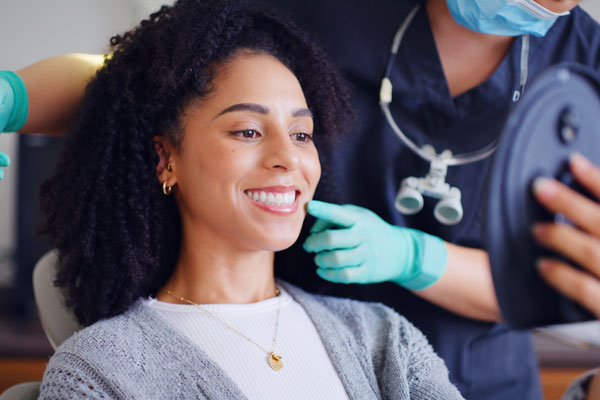 Screening for oral cancer is an important part of preventative dental care. Unfortunately, oral cancer is a disease that is not often talked about. Very few events support oral cancer research and awareness, even though oral cancer takes one life every day in the United States. Many people do not seek or receive treatment until cancer has progressed. As is the case with all types of cancer, early detection is key to treating it in time before it spreads to other parts of the body. Here we outline how oral cancer screenings work, how often you should have an oral cancer screening, who is susceptible to getting oral cancer, and preventative dental care measures against oral cancer.
Screening for oral cancer is an important part of preventative dental care. Unfortunately, oral cancer is a disease that is not often talked about. Very few events support oral cancer research and awareness, even though oral cancer takes one life every day in the United States. Many people do not seek or receive treatment until cancer has progressed. As is the case with all types of cancer, early detection is key to treating it in time before it spreads to other parts of the body. Here we outline how oral cancer screenings work, how often you should have an oral cancer screening, who is susceptible to getting oral cancer, and preventative dental care measures against oral cancer.
How common are oral cancer screenings?
Unfortunately, oral cancer screenings are not commonly performed as a part of preventative dental care routines, which is why oral cancer is not often detected in the early stages. Most people never have an oral cancer screening done. If you have never been screened for oral cancer, it is recommended that you schedule an oral cancer screening as soon as possible. Oral cancer screenings should be done twice a year.
What happens during an oral cancer screening?
Your dentist will look for signs of abnormal tissue, which includes checking for visible symptoms such as red and white bumps, hard lumps, rough patches, or changes in the position of your teeth. Most of the screening is done visually. Your dentist will also feel your cheeks and the inside of your mouth while wearing gloves. The purpose of this is to identify whether you have any lumps in these soft tissues. Since oral cancer can affect any area of your mouth, the exam must be done very thoroughly. With the constant improvement of technology, there may be other tools and tests your dentist will use to screen for oral cancer, as well as the methods described above.
How often should I have an oral cancer screening done?
How often you are screened for oral cancer depends on your risk level for getting oral cancer. Most patients are advised to have an oral cancer screening done annually as a measure of preventative dentistry. If you are at high risk of oral cancer, you should have screenings done twice a year.
Who is susceptible to getting oral cancer?
It is a common misconception that only older men get oral cancer. Smoking and drinking alcohol or chewing tobacco are risk factors for oral cancer, and both men and women smoke and drink. Also, recent medical research has found that some strains of the HPV virus can cause oral cancer, and this has changed the way dentists view oral cancer and determine who needs to be screened for it. HPV can be contracted in the teenage years, so oral cancer can happen to teens and anyone else who has HPV. If you smoke cigarettes, chew tobacco, drink alcohol, or have HPV, you should be diligent about getting oral cancer screenings every six months.
What can I do to prevent oral cancer?
One of the most effective ways you can prevent oral cancer is to stop chewing tobacco. Chewing tobacco can make you 60 times more likely to get oral cancer. You should also stop smoking cigarettes and limit how much alcohol you drink. Additionally, you should limit sun exposure and do your best to prevent sunburn. Getting tested and vaccinated for HPV can also lower your oral cancer risk.
Request an appointment or call Fort Lee Family Dental at 201-620-9772 for an appointment in our Fort Lee office.
Recent Posts
Oral hygiene is a vital part of your preventative dental care. Achieving and maintaining good oral hygiene can be difficult, but the effort pays off in the form of healthier teeth and gums and reducing tooth decay. In this article, we'll discuss how to maintain good oral health through daily routines that help keep your…
Preventative dental care such as visiting the dentist is a huge cause of anxiety and stress in many patients. The thought of being in the examination chair and hearing the tools and possible irritation of your teeth and gums can be quite upsetting. However, going to the dentist regularly will eliminate those concerns as you…
Fluoride treatments are very important in preventative dental care. Every patient wants their dentist to provide them with all the necessary tools to keep their smile bright and white. You go to the dentist twice a year as recommended and brush and floss your teeth regularly.Doing your part in your oral care routine only goes…


